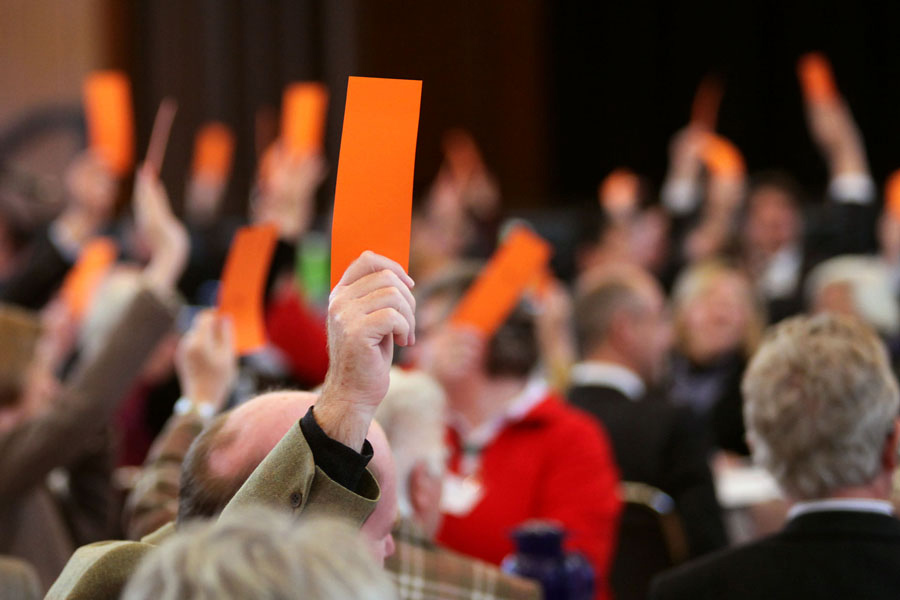GERMANY " "" "
The plenary assembly of German Catholics in Münster

Christians’ participation in political life; the joint participation of men and women in the life of the Church, the Church and religion in pluralistic societies; marriage and the family as viewed by the public opinion; the ban on medically assisted suicide; European integration process; the Katholikentag (German Catholics’ Day) 2014. These are the various themes addressed during the plenary meeting of ZDK, the German Catholics’ Committee, held April 26-27 in Münster, whose opening address was delivered by Monsignor Felix Genn. Alois Glück, ZDK President, presented the situation of German Catholics at national level, with an overview of the situation in Europe. Follows an excerpt on the highlights of the meeting. The opportunity of structural reforms inside the Church. In his speech Glück referred to the recent events that preceded the elections of Pope Francis and paid tribute to Benedict XVI. He said: “his renunciation is a sign of human greatness, an act of humility, and an expression of his faith. It represents the highest sense of responsibility towards the Church”. The Pope’s renunciation and the election of an extra-European Pope, “signals an epochal event, whose impacts on the pontifical see are yet to be seen”. Glück spoke of the opportunity to implement “structural reforms within the Catholic Church vis a vis the assumption of equal responsibilities by the Central and local Churches, and of the role of the Holy Father to this regard. Since the onset Pope Francis has made significant gestures. He highlighted the mission of the Bishop of Rome, which bears momentous relevance within the Catholic realm and for ecumenism”. Religion in society. The ZDK President called upon Catholic faithful to take an active role in the ongoing debate on the Church’s presence in society and in the public domain as a whole. “I believe that at present there are no better options for the common good and for society than the present State-Church system in Germany”, he declared. “For this reason, bishops and lay people alike should provide common reflections”, he continued, referring to ongoing political and societal debates in Germany. Glück said that the Church’s altered societal status “shouldn’t be perceived as a loss: religion will continue playing a role also in modern societies”. Moreover, “societies must perceive convincing motivations underlying the role and the significance of religion”. No to euthanasia. The ZDK President delved into the question of euthanasia and palliative treatments. He conveyed his concerns over the evolution of the political debate regarding the ban on assisted suicide organizations, rejecting the claims advocating the legalization of such practice when implemented by non-profit organizations. Glück called for “the realization of support centres for serious and termination patients at national level”, making the most of opportunities provided by hospices and palliative treatments. “For us and for our Church, a strong commitment” to this regard “also serves as a credibility test of our requests to policy-makers”. The rejection of euthanasia is underlined also in ZDK’s final statement: “the dying person doesn’t need to be helped to die. He/she needs to be helped at the time preceding his/her death”. Jointly addressing the challenges triggered by the crisis. Finally, Glück addressed the situation in Europe, and underlined its “topical, dramatic relevance”. With reference to the worrying unemployment rates in South European countries he underlined “the growing risk of social tensions triggered by the financial and debt situation, that could undermining political stability”. Having guarded against the claims of those calling for exit from the Eurozone, described as “a wrong way to solve the ongoing crisis”, the ZDK president added: “We need to provide an answer to the true cause of the crisis, namely, the unsustainable indebtedness of the public sector. Moreover, “economic and monetary union is not enough”, there is more to this and the challenges triggered by the crisis must be jointly addressed. “The States of Europe cannot be intimidated by those presenting easy ways out. At the same time, it is necessary to take seriously the anxieties and worries of those involved and find acceptable solutions for them. The danger for the peaceful future of Europe is the detachment of its populations, and the resurgence of ancient prejudice, which would undermine the foundations of European cooperation. We must oppose all of this”, he warned.